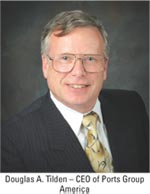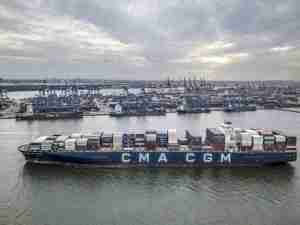 Douglas A. Tilden, CEO of Ports Group America, (parent company of Marine Terminals Corporation) warned that America's lack of a clear national transportation policy, coupled with land-use and environmental challenges, makes it almost inevitable that some of the projected surge in Asian cargo volume over the next decade will begin flowing through ports in Mexico and Canada rather than the US West Coast. Tilden spoke at the spring, 2008 Joseph P. Rizza Lecture Series on the campus of The California Maritime Academy in Vallejo.
Douglas A. Tilden, CEO of Ports Group America, (parent company of Marine Terminals Corporation) warned that America's lack of a clear national transportation policy, coupled with land-use and environmental challenges, makes it almost inevitable that some of the projected surge in Asian cargo volume over the next decade will begin flowing through ports in Mexico and Canada rather than the US West Coast. Tilden spoke at the spring, 2008 Joseph P. Rizza Lecture Series on the campus of The California Maritime Academy in Vallejo.
As head of a firm with a $1.6 billion budget and 95 terminal operations in 49 different ports, Tilden has the experience and perspective to assess the big picture. It is his view that even under the best of circumstances, the US simply cannot get ahead of the looming wave of new cargo volumes headed its way between now and 2020.
'Los Angeles/Long Beach traffic is expected to grow four-fold by the end of the next decade. But there hasn't been a single application for new terminal capacity approved in that area for the last five years and under the best of circumstances we might see two smaller facilities within the next 5-7 years. The plain fact is that America needs to add the equivalent of a new port the size of New York and New Jersey every year for the next 12 years to meet growth demand.'
Tilden blamed the problems the US is facing on several factors: 'Overall, I think we've lost the political will to build new port capacity and the rail and highway infrastructure which must go with it. Local politicians complain they see little of the economic benefits of a port locally but field all the complaints about the congestion and pollution they generate.'
Second, he said, there simply is no national transportation policy. 'I can sit down with the transportation minister of a country like Mexico and get the big picture about their plans. I'd have to wade through 20 different agencies in Washington to get the same information.'
Tilden also blamed what he called 'environmental Balkanization': 'There are so many conflicting local, state and regional environmental regulations that it is hard for companies to make rational use of their assets. We want to be good stewards, but we face a welter of different local and regional regulations just on what fuels we can use for operations'propane, liquid natural gas or bio-diesel. When a change in rail rates or some other market factor suddenly shifts cargo volumes from one port to another, we often can't move our equipment assets because they don't meet the standards of the new location.'
Terminals in Asia and Europe have made much better use of technology to maximize land use and operational efficiency. 'Our long delays in modernizing ports, many of them already hemmed in by urban growth, make it much harder to make needed changes today. It means shutting down portions of them when they are already strained by existing volumes.'
Tilden said East Coast won't take up much of the slack. 'The pending expansion of the Panama Canal will primarily benefit bulk cargoes like Brazilian soybeans bound for Asia. But for merchandise shipments, the extra fuel costs and tolls of a Canal transit don't make economic sense. Merchandise will continue to flow to the West Coast.'
Given those factors Tilden said, the diversion of cargo flows to new or planned ports in Canada and Mexico is almost inevitable. 'Look at the advantages developers face in those locations ' the ability to build true 'greenfield' operations from scratch with modern technology.'
Commenting on a new federal government study that emphasizes the need for America to modernize and expand its national transportation infrastructure, Tilden said that to have any chance of success, Congress and state governments will have to prioritize those projects that will have the biggest impact on improving efficiency and r








